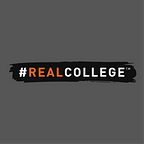Advancing a Federal Agenda for #RealCollege Students
By Mark Huelsman, Policy Fellow for The Hope Center for College, Community, and Justice
The pandemic and economic crisis of the past year have given us countless reasons why we need to invest in a supportive safety net that starts to redress the deep and historical injustice across our economy.
Millions of students, workers, and families experienced an economic catastrophe for which they could not possibly have prepared. People forced into unimaginable medical and financial hardships, disproportionately affecting the almost almost 30 million non-elderly Americans. Millions of people, disproportionately people of color, are still reporting an inability to afford food and to pay their rent or mortgage, furthering the inequities that that existed long before the pandemic. College enrollment and applications for financial aid are down, and some states are facing deep budget holes that have historically resulted in cuts to higher education institutions). These are the priorities that have galvanized The Hope Center and its partners for years. It is more important than ever that we address the basic needs insecurity of students, invest in public colleges and minority-serving institutions, and modernizing higher education and public benefits programs to reflect the living expenses of students.
That’s why The Hope Center has released its first #RealCollege Federal Policy Agenda, a series of systemic reforms to address intersecting racial and structural inequities, a threadbare safety net, and the perpetual underfunding of public higher education and Minority-Serving Institutions. For higher education, the agenda includes a focus on the following:
- Create a federal-state partnership that ensures adequate and equitable funding for public colleges and universities.
- Reform federal higher education funding formulas to better account for part-time students.
- Make permanent federal emergency aid for students.
- Enhance affordability by formalizing partnerships between federal agencies.
- Cancel student debt, reform higher education tax credits, and improve for-profit college accountability.
And in terms of modernizing the safety net, we call for the following:
- Treat the pursuit of a postsecondary credential as meeting any compliance, work participation, and/or core activity requirements for all public benefit programs. Remove mandates to combine work with education, time restrictions, and limitations on programs or degrees in the Supplemental Nutrition Assistance Program, Temporary Assistance for Needy Families program, and Child Care Development Block Grant program. Additionally, pass The College Student Hunger Act of 2019 which would improve access to food for students.
- Expand the National School Lunch Program (NSLP) to higher education. Short of a full expansion, Congress should pass the Food for Thought Act which establishes a pilot program that allows community colleges to provide meals and snacks to eligible students.
- Fully fund federal child care programs to meet the needs of eligible populations. Expand investment and access to child care subsidies and support through the Child Care Development Block Grant, Child Care Access Means Parents in School, Head Start, and Early Head Start programs.
- Create affordable housing programs for students. Pass the Housing for Homeless Students Act which would allow full-time college students who experienced homelessness to benefit from the Low-Income Housing Tax Credit program. Remove student restrictions in public housing programs and identify best practices for federal collaboration with colleges and universities.
- Improve access to affordable health care, increase the federal minimum wage to $15, expand broadband internet access, and improve the Earned Income Tax Credit (EITC). We support the broader agenda to help working and middle-income families access economic opportunity.
Successfully navigating this crisis requires us to reflect on the new economics of college: the price of college is unaffordable for too many, students must spend too much time focusing on financing college and away from learning, and the tools we use to pay for school range from inadequate to predatory. Aid to students is insufficient, especially as the price of rent, food, childcare, and other basic necessities goes up. Most students work, and many work long hours, but wages remain stagnant and the minimum wage remains a poverty wage.
It also requires us to have solutions that meet the moment, that address a crisis of affordability and debt for Black and Brown students, and that create a set of policies and programs that students can navigate seamlessly while recognizing students’ basic humanity. It’s time to allow students to focus on learning, rather than how they’re going to afford school and life.
The landscape we face today is very different from 1965, when many of the federal higher education programs were conceived. We have learned invaluable lessons in the past few decades, and certainly during the last two recessions. We know how to build public support programs that help students and families and ones that acknowledge structural racism and racial wealth inequality. We have an opportunity to create a new ecosystem of social policies that center students’ experiences, that do not penalize the pursuit of education, and that allow everyone to thrive.
You can read our 2021 policy agenda here.
Mark Huelsman is a Policy Fellow at the Hope Center, where he works on the Policy & Advocacy team to further our systems changes efforts on behalf of #RealCollege students. He recently served as the Associate Director of Policy & Research at Demos, where he led the organization’s policy work on college affordability, student debt, and racial equity in higher education, and contributed to the organization’s work on the racial wealth gap and structural democracy reform.
Interested in sharing your #RealCollege story? Submit here.
